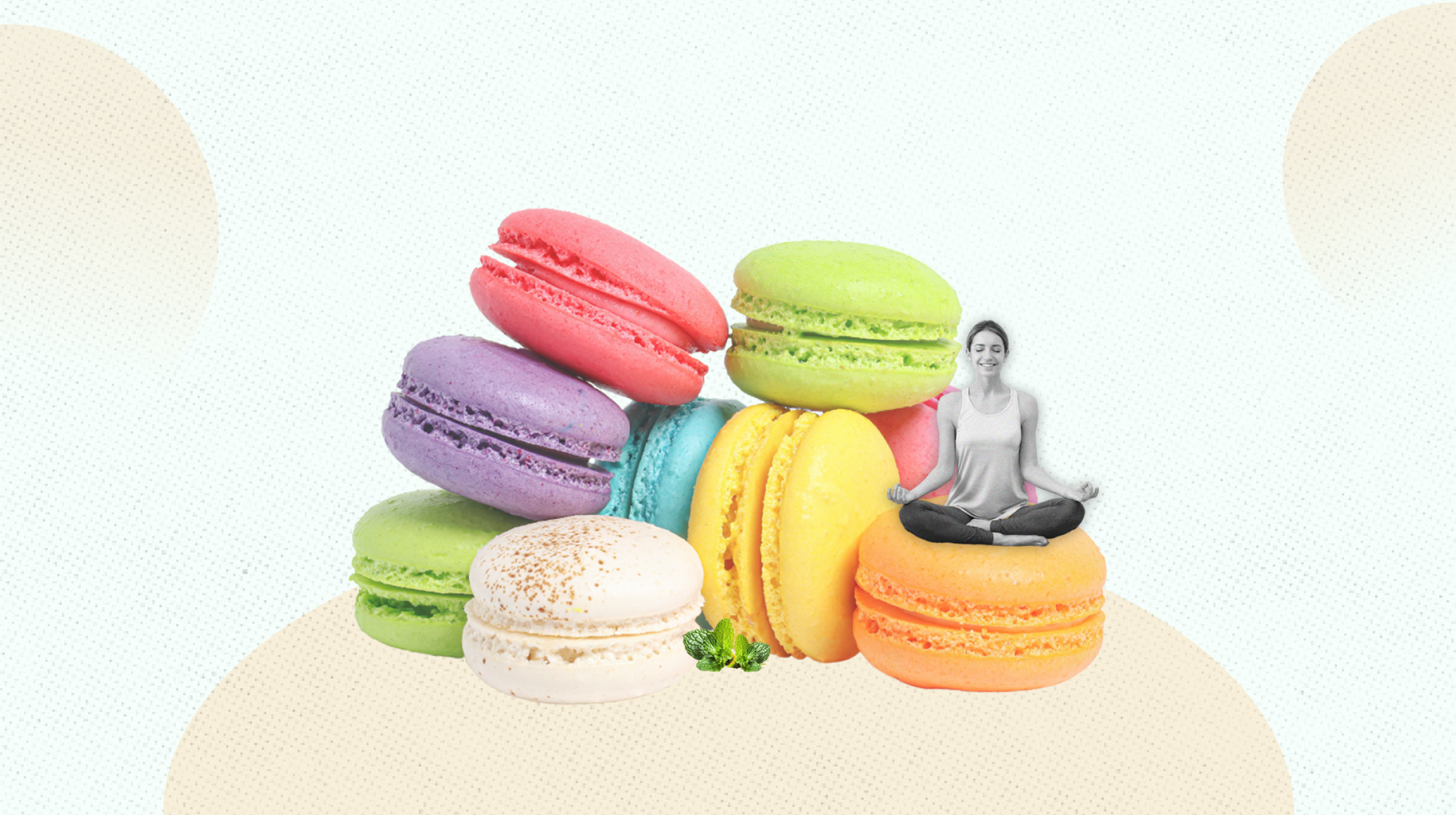 Evidence Based
Evidence Based
Evidence Based
This article is objectively based on relevant scientific literature, written by experienced medical writers, and fact-checked by a team of degreed medical experts.
Our team of registered dietitian nutritionists and licensed medical professionals seek to remain objective and unbiased while preserving the integrity of any scientific debate.
The articles contain evidence-based references from approved scientific sites. The numbers* in parentheses (*1,2,3) will take you to clickable links to our reputable sources.
Are Macarons Vegan? Explore If This Famous Dessert Is Allowed On A Vegan Diet In 2024

If you are looking for a healthier lifestyle that is also sensitive towards animals, the vegan diet might be for you. In this dietary pattern, all animal-based products are avoided. A vegan diet offers many health benefits, like preventing cardiovascular disease.
You probably have seen rows of round sandwich cookie-like treats at the bakery. Macarons are usually a light and airy confection, sandwiching a sweet filling. Baked goods can be part of a vegan diet when the recipe is modified.
You might be wondering then: Are macarons vegan? Let’s find out!
Can Vegans Eat Macarons?
No, macarons are not a vegan food. On the other hand, they do tend to be gluten-free and vegetarian. Macarons are made of egg whites and dairy products, which are animal-based products.
Its sugar might also not be vegan-friendly due to its production process. However, you may find some vegan macarons at the vegan bakery. There are also recipes for vegan macarons to suit your dietary needs.
Are Macarons Vegan?
A vegan diet[1] consists mainly of plant-based foods. In a vegan diet, people avoid the consumption of animal-based foods and products. The foods excluded are dairy, animal proteins, and fats.
On the other hand, vegans consume more fruits, vegetables, starches, and plant-based proteins like legumes.
Macarons are then not a vegan-friendly food. At a vegan bakery, you might come across vegan macarons. You can also find recipes to make vegan macarons that align with your dietary preferences.
Plant-based diets, including vegetarian and vegan, provide good health benefits. Usually, people following these dietary patterns may do so to improve overall health, also due to ethics around killing an animal for consumption.
No matter your reasoning, plant-based diets show some protective health benefits.
Health Benefits Of The Vegan Diet
The health benefits of the vegan diet may come from increased consumption of legumes, whole grains, fruits, and veggies. Some of them are:
- Decreased risk of chronic diseases: The vegan diet offers a variety of phytonutrients. These compounds can be antioxidants, protect arteries, and decrease the risk of cardiovascular diseases.[2] Another reason might be related to decreased consumption of saturated fats from animal sources, which in excess is associated with cardiovascular disease. It might be wise not to eat too much coconut oil and consume some omega-3 from chia seeds and flax seeds.
- Healthy gut bacteria: The vegan diet is also a good source of fiber, which may help with keeping a good variety of healthy gut bacteria.[3] Vegan diets are more likely to have more bacteria diversity, helping keep healthy digestion, absorption of nutrients, and protection from diseases.
- May improve your mood: Increased consumption of fruits and veggies in vegan and vegetarian diets may have a role in decreasing the risk for depression.[4]
Dietary Needs Of Vegans
A vegan diet does need to be planned to obtain adequate vitamins and minerals. Dietary iron, vitamin D, and B12 intake are decreased in the vegan diet. It is important to plan your meals or supplement accordingly.
You may find a vegan meal delivery service that simplifies this task or use a vegan meal replacement bar.
Consider supplements like vitamin B12, iron, calcium, and vitamin D. Discuss with your medical providers options adequate for you.
If you are not consuming the recommended five servings of fruits and vegetables daily, you may consider supplements like green powders.
When following a vegan diet, you may include sweets and baked goods. It is still recommended to limit your sugar and saturated fat consumption. You can still eat vegan macarons and vegan butter.
The Dietary Guidelines for Americans recommend limiting added sugar and saturated fats to less than 10% of daily calories. A 2000-calorie diet would be around 50 grams of sugar or four tablespoons daily.
The limit for saturated fats like butter and coconut oil should be around 22 grams daily. All this to say, enjoy your macarons and avoid eating a dozen in a sitting.
What Are Macarons?
Macarons or French macaroons are a sweet meringue confection. They originated from Italy, brought to France, where they became popular. It probably looked different from what we see at our local bakery or store, which is a sandwich cookie-style confection.
It is made by first preparing a meringue. Which is then baked, giving it a crunchy exterior with an airy feel. Usually, in a round shape, two tops are then structured together with jam, ganache, or buttercream. Creating a sort of sandwich.
You will find macarons in a variety of flavors and colors. These treats are mainly gluten-free. Macarons do contain almond flour and eggs. These two are common allergens, and you should be aware of them.
Differences Between Macarons & Macaroons
It can be tricky to distinguish between these two treats. While a macaron (mah-kah-ron) is made of meringue, the macaroon (mak-a-roon) has a cake consistency. You may find that in other parts of the world, they refer to the sweet meringue dessert as the Parisian or French Macaroon.
The macaroon is usually a shredded coconut, ground almonds, or other nut confection that might look like a small haystack. You may find almond or coconut macaroons at your local bakery.
Both of these tend to be gluten-free. They may also be nut-free if you adjust the almond flour in the macaron for an alternative. Neither treat is vegan macarons, but their recipe may be adjusted to exclude egg whites.
Avoiding Non-Vegan Ingredients In Vegan Macarons
As mentioned before, macarons usually contain egg whites, granulated sugar, and powdered sugar. In addition, some chosen flavors of macarons may contain additional ingredients like milk.
Macarons contain ingredients that are avoided in the vegan diet. The main ingredient to make the macaron cookie is the egg whites to make the meringue. Some vegans also avoid refined sugar. Bone char is used as a natural carbon to bleach sugar.
The sugar itself won’t contain bone char remnants, which is why some vegans may choose to consume it.
Conversely, the fillings for the macarons may be vegan or vegetarian-friendly. Macaroons may usually have jam, ganache, or buttercream filling. Always ask what it contains to make sure it is vegan-friendly.
Best Vegan Macarons Alternative Ingredients
For those wondering if Are Macarons Vegan, it has a recipe to make vegan macarons. Scouring the internet or your favorite vegan cookbooks, you may find vegan versions to make vegan macarons. Since it is baking, you need to find a recipe that fits your environment.
You can also read how to troubleshoot baking macarons in your oven or environment.
A common substitute for egg whites in a vegan macaron recipe is aquafaba.[5] This is salvaged from the cooking water of garbanzo beans and sometimes other legumes. You may use the aquafaba that comes with canned chickpeas.
To make the meringue, you might need cream of tartar, which will help the peaks keep their structure. Aquafaba can be used to create other vegan desserts.
For fillings, you can use vegan buttercream made with plant-based milk and vegan butter, such as coconut milk and coconut cream, or choose a fruit filling like jam. You can find ingredients like coconut milk, cream, and jam in many local stores.
Sugar can be used in vegan macaroons, but you can use beet sugar or raw sugar if preferred. To be sure the sugar purchased meets your needs, contact the manufacturer to ask if their sugar is bleached using bone char.
Final Thought
Now you have the answer to the question “Are Macarons Vegan?”. Traditional macarons are a tasty treat but are not vegan. They can be part of a vegetarian diet in their traditional macaron recipe, although not in the vegan diet.
The macaron recipe can be easily adjusted to be a part of the vegan diet by adjusting the eggs with an alternative like aquafaba.
Frequently Asked Questions
Not really. They contain egg whites, which come from chickens. Although they can be prepared to be vegan-friendly.
Not always. The top meringue cookie does not contain dairy. You can always ask if there are fruit fillings instead.
Although not vegan-friendly, macarons can be consumed by people following a vegetarian diet.
Traditional macarons are gluten-free, but you should always be aware of cross-contamination or gluten-including additives, especially for macaron fillings.
+ 5 sources
Health Canal avoids using tertiary references. We have strict sourcing guidelines and rely on peer-reviewed studies, academic researches from medical associations and institutions. To ensure the accuracy of articles in Health Canal, you can read more about the editorial process here
- Craig, W.J. (2009). Health effects of vegan diets. The American Journal of Clinical Nutrition, [online] 89(5), pp.1627S1633S. doi:https://doi.org/10.3945/ajcn.2009.26736n.
- Trautwein, E.A. and McKay, S. (2020). The Role of Specific Components of a Plant-Based Diet in Management of Dyslipidemia and the Impact on Cardiovascular Risk. Nutrients, [online] 12(9), pp.2671–2671. doi:https://doi.org/10.3390/nu12092671.
- Aleksandra Tomova, Bukovsky, I., Rembert, E., Yonas, W., Jihad Alwarith, Barnard, N.D. and Kahleova, H. (2019). The Effects of Vegetarian and Vegan Diets on Gut Microbiota. Frontiers in Nutrition, [online] 6. doi:https://doi.org/10.3389/fnut.2019.00047.
- Jain, R., Phureephat Larsuphrom, Degremont, A., Latunde-Dada, G.O. and Philippou, E. (2022). Association between vegetarian and vegan diets and depression: A systematic review. Nutrition Bulletin, [online] 47(1), pp.27–49. doi:https://doi.org/10.1111/nbu.12540.
- Eren, E., Necattin Cihat Icyer, Nevruz Berna Tatlisu, Mahmut Kilicli, Gizem Hulaga Kaderoglu and Omer Said Toker (2021). A new trend among plant-based food ingredients in food processing technology: Aquafaba. Critical Reviews in Food Science and Nutrition, [online] pp.1–18. doi:https://doi.org/10.1080/10408398.2021.2002259.



